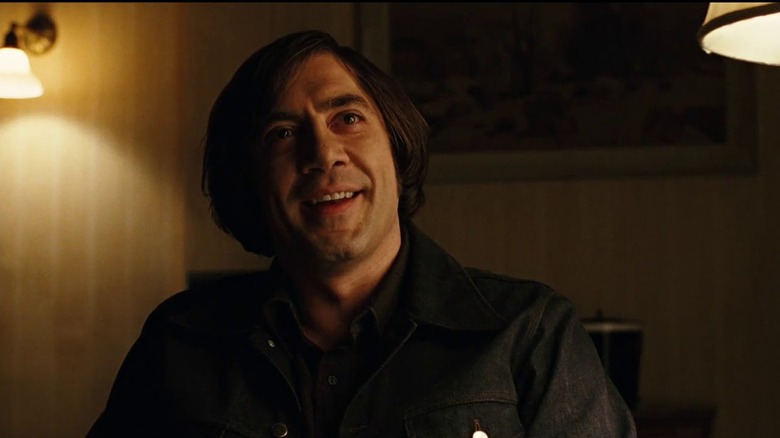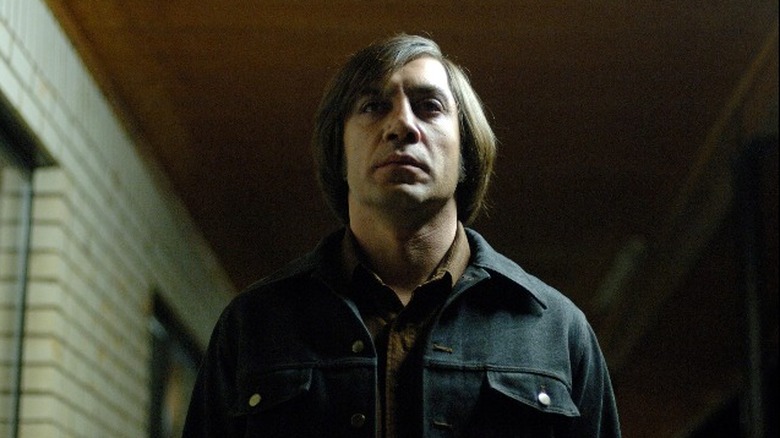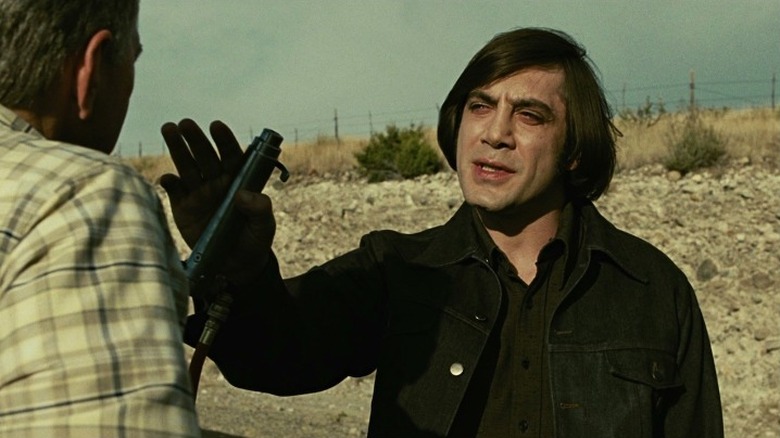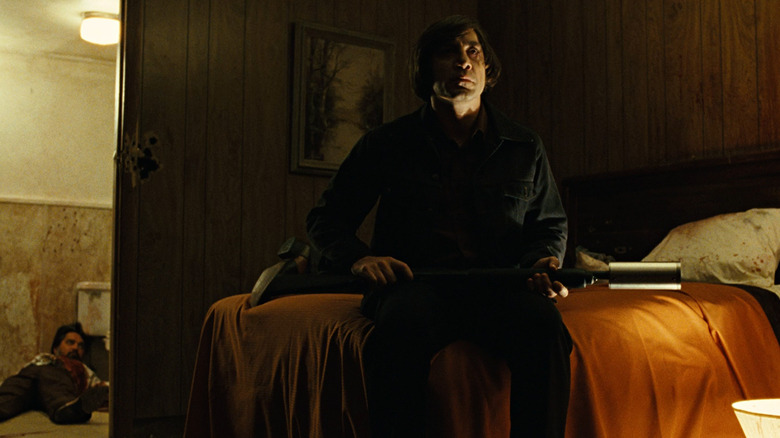Javier Bardem Had A Hard Time With That No Country For Old Men Haircut
There are plenty of things to find unsettling and downright terrifying about "No Country For Old Men" antagonist Anton Chigurh. There's the disturbing grin he eagerly flashes to hide murderous intent and his brutal efficiency with a captive bolt stunner. Not to mention his unfeeling disregard for human life. For these reasons, it's probably no surprise that Javier Bardem's portrayal was even deemed the most realistic of a clinical psychopath in a film by the Journal of Forensic Sciences.
That all goes to explain why the actor nabbed an Oscar for the performance, and also why Chigurh sits at the top of the list of people you wouldn't want hunting you for stealing two million dollars in a drug deal gone awry. Yet one of the character's most striking features has nothing to do with his ruthless demeanor: his haircut. I've heard Chigurh's hairdo described as both a symbol of his villainy and as a distraction meant to disguise it like his accent.
With just a few scissor snips the Coens created their crowning achievement within the treasure trove of character idiosyncrasies that exist within their films. Although, Bardem himself had a ton of mixed feelings about what the directors were asking him to do to his beloved hair.
Bardem was reluctant about the character
Understandably, when Bardem first heard about Chigurh he was less than enthusiastic about having to get inside the tormented head of such a character. But as the actor told the Independent, that changed when he read the source material:
"Did I like the guy when I read the screenplay? No, not at all. But then, when I read the novel [by Cormac McCarthy], I understood much better the philosophy behind the whole thing, and this idea about Chigurh and his 'principles.' So I saw that, in his own way, this is a complex guy. That helped me get a handle on him."
The "principles" Bardem refers to are of course Chigurh's amoral belief system. Throughout the film, he explains in so many actions and words that he views himself simply as an instrument of fate completing his task — a "genie out of the lamp" as the actor calls him. And once unleashed he deals out death where he believes it's been earned while also never acknowledging his own complicity in the acts.
Once Bardem had Chigurh pinned as a killer with a flawed but compelling worldview, he had a better understanding and therefore more of an appetite to play the part. But there was still one more hurdle for Bardem to overcome when it came to his misgivings about Chigurh. Evidently, it was one thing to play a psychopath and something else entirely to have to wear a truly psychotic haircut.
An unsettling haircut for an unsettling man
In that same Independent interview, Bardem explained that it wasn't just the fact that Chigurh's haircut was ugly, but the length of time he'd need to sport it. "To be there on set for three months with that haircut, man, was really f***ing hard," he admitted. But a little adversity can be an actor's best friend, and Bardem's intense distaste for the haircut actually led him to really connect with the character.
Especially in terms of Chigurh's violent sense of isolation from the world and people around him, Bardem was able to relate his character's foreignness to Texas to his own sense of foreignness in American film. "You can barely speak the language and you have this weird look where people stare at you even when you go to the shop to buy milk," Bardem explained. "It made me feel isolated, in the way that Chigurh might have." His stranger in a strange land characterization is only bolstered by the fact that his first appearance in the opening scene bears similarities to David Bowie's entrance in "The Man Who Fell To Earth."
Chigurh is clearly characterized as a man set apart from every other person in the film, separated from them by both his personal philosophy and his outward demeanor. What's interesting is that he blends in enough to at least prevent the escape of his unsuspecting victims — illustrated chillingly in the opening minutes when Chigurh smoothly convinces a man to "stand still" so he can put the captive bolt stunner to his head and fire it.
But it was also the reason he took the part?
Part of the reason Bardem opened up to the haircut is owed to its creator, the late hairdresser Paul LeBlanc. Bardem told Vanity Fair that it was during a visit with the Coens inside a makeup trailer in New Mexico that he was first shown the haircut's inspiration — which was a photograph taken in the 1950s or '60s of a man and two sex workers standing in front of a Mexican border-town brothel. He continued:
"And then the hairdresser, Paul, who passed away recently, amazing hairdresser, in a second, with my own hair, he made [imitates snipping], and I saw it and I said, 'Yes, I have to make this movie.' I mean, this is such a Coen brothers look. And, because it was funny, it was ridiculous, it was fun. And then that in comparison with what the character is, would make a very good Coen brothers character to play."
But the juxtaposition of Chigurh's absurd haircut and violent personality doesn't just work because they two feel like ridiculous polar opposites. LeBlanc, who worked on films like "Star Wars" and "Casino," looked to history to find characters who similarly guided their violent deeds with misguided detachment. Eventually, he focused on the Crusades when English holy warriors sported moptops. "It was a dangerous time and we wanted to make Javier timeless and dangerous at first sight," he told The Guardian in 2008.
The unsettling synchronicity between Chigurh's haircut and his actions is proof that LeBlanc found the perfect style to subtly spotlight the character's malignant nature. It's also pretty on brand for the Coens to create such a character with hard-to-stomach quirks that somehow make them all the more enticing to play — and watch.



